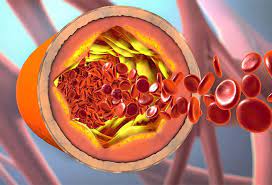Coronary Heart Disease
The Heart Specialist in Apollo Sarita Vihar Delhi, says that High cholesterol levels can lead to a
variety of coronary diseases. High cholesterol levels cause plaque to build up on the walls of
arteries, causing further narrowing. It reduces blood flow, which leads to heart attacks and strokes.
- Blood Pressure Is Excessive
High blood pressure is caused by high cholesterol levels. Furthermore, when the arteries narrow, blood flow from the heart to other organs becomes difficult. As a result, the heart tries to pump blood with greater force, resulting in high blood pressure.
- Peripheral Vascular Disease
Peripheral vascular disease is a blood vessel disorder. It generally affects blood vessels that are indirectly connected to the heart and brain. Plaque clogs these blood vessels in peripheral vascular disease.
- Kidney Failure
As per Dr Vivek Kumar Best Cardiologist in South Delhi, Kidney failure can occur as a result of high cholesterol in some cases. High cholesterol levels cause plaque buildup in blood vessels connected to the kidneys, reducing blood supply and resulting in shrinking and scarring.
- Aneurysm
Aneurysms are another cause of unexpected death. A lump form in the inner lining of weakened blood vessels, causing them to burst.
- Stroke
A stroke occurs when the arteries become blocked, leaving no room for blood to flow to the brain. A stroke occurs when blood flow to a specific area of the brain is restricted.
- Cramps in the Abdomen
Cholesterol accumulation in the liver and spleen causes enlargement of the liver and spleen. This places strain on the abdominal cavity, resulting in abdominal pain.
- Conclusion
According to cardiologist in apollo hospital Sarita Vihar Cholesterol is an amphipathic lipid that
belongs to the steroid family of lipids. There are two types of cholesterol: HDL cholesterol (good
cholesterol) and LDL cholesterol (bad cholesterol).
A high level of LDL cholesterol in the blood increases the risk of coronary disease, heart attack, and stroke. HDL cholesterol, on the other hand, aids in the elimination of the effects of other harmful cholesterol in the body.
A variety of factors influence cholesterol levels in the body. Age, diet, genetics, medications, lifestyle, and diseases all influence cholesterol levels.
Specific risks associated with high cholesterol levels can result in sudden death. Furthermore, high cholesterol levels are associated with diseases such as coronary heart disease, peripheral vascular disease, and aneurysm.
As a result, you should consume a diet high in monounsaturated and polyunsaturated fats. Furthermore, you should stop smoking and drinking alcohol.
This can be extremely beneficial in managing cholesterol levels in the body.
According To the Dr. Vivek Kumar is a leading best heart doctor in Apollo hospital Delhi, India. Dr. Vivek Kumar has over 12 years of experience in the field of Cardiology and has successfully cured thousands of patients, making him one of the best heart doctors in South Delhi and the best heart specialist doctor in Delhi.
